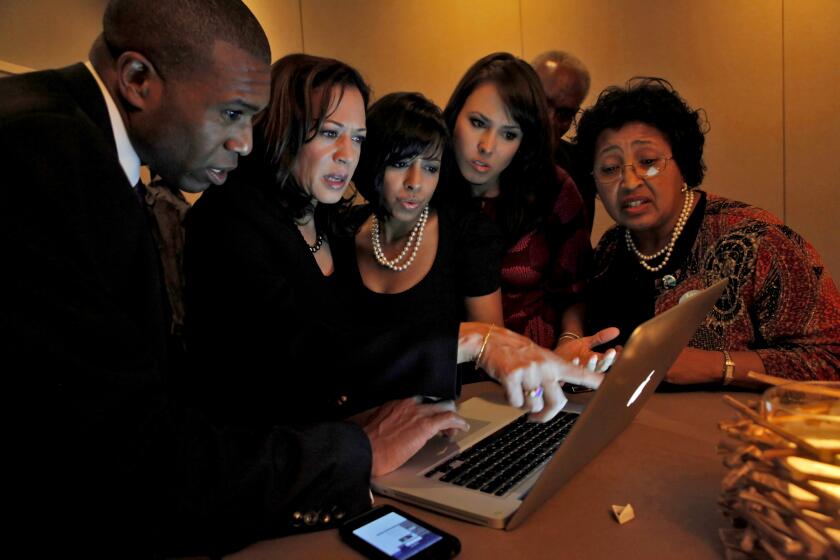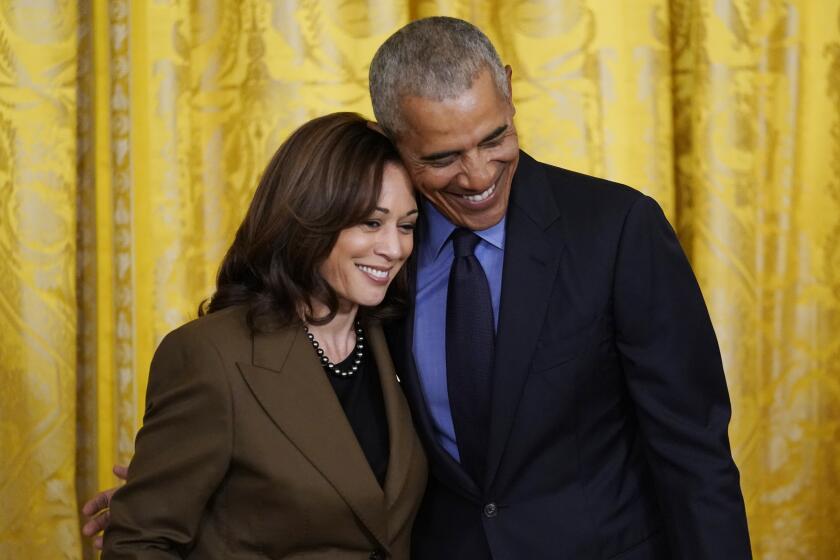Slate Cards Frustrate Candidates : Mail Specialist Gets Their Funds, but Not Their Approval
The political mass-mail specialist who provoked an outcry with his campaign flyers for Los Angeles school board member Julie Korenstein and City Council candidate Lyle Hall is no stranger to controversy.
Fred Huebscher produces and distributes so-called slate cards that urge voters to cast their ballots for lists of candidates, most of whom have paid thousands of dollars to be included. He is one of many practitioners in this growing field, which melds politics and profits and sparks annual complaints of deception or misrepresentation from candidates, consultants and political party leaders.
“They’re not partisan, they’re not candidate-oriented, they’re commercial,” state Sen. Ed Davis (R-Valencia) said of the slate cards.
“I just think people ought to learn to tune out slate mailers as some grubby thing from a hustler rather than some communication for a political candidate,” he said. “They mix issues and candidates with no conscience whatsoever, totally misleading.”
Triggered Protests
Huebscher is a particularly controversial practitioner of this controversial technique. In the past three years, he has triggered protests from Democratic and Republican leaders with his slate mailers, which critics say are sometimes designed to create the impression that Democrats are actually Republicans.
Moreover, some competitors say, Huebscher has invented organization names as the sponsors of his flyers--the L.A. Democratic Council, for instance--and used party logos, photographs and mail-in gimmicks to give the misimpression that the pieces were produced by the official political party organizations.
“He personifies what most people think are bad about slate cards,” said one veteran consultant who asked not to be named. “We all grit our teeth and give him our money.”
Responds to Critics
Huebscher responded Saturday that he has always sought to remain within the law and standard slate-mail practices. “There are a lot of people who do them,” Huebscher said. “I don’t think I’m any different than anybody else.”
Frank Visco, state Republican Party chairman, disagrees. Visco asked the state Fair Political Practices Commission last week to investigate Huebscher’s June mailings. He maintained that they failed to carry a disclaimer stating that they were not produced by an official political party organization. Such disclaimers are required under a 1987 state law.
“The only purpose is to deliberately deceive the voters,” Visco said.
The mailings, which were sent to Republican households and included the party logo and photos of former President Reagan, were produced by another of Huebscher’s firms, the L.A. Taxpayers Alliance. The fact that Hall and Korenstein are registered Democrats was not mentioned. The FPPC is reviewing the GOP’s complaint about the disclaimer, spokeswoman Sandra Michioku said last week. The commission does not regulate the content of mailers.
Huebscher said he did not include the disclaimer because the law defines slate cards as “a mass mailing that supports or opposes a total of four candidates or ballot measures.” His flyers supported three candidates. However, each flyer urged voters to oppose a fourth candidate: in Korenstein’s case, her opponent, Jerry Horowitz, and in Hall’s case, his opponent, City Councilman Ernani Bernardi.
Huebscher said he believed that this did not, in effect, represent a fourth endorsement because supporting Korenstein and Hall meant automatically opposing their only opponents. “I always comply with the law,” Huebscher said. “It was not an attempt to mislead voters.”
The nature of slate mailers invites controversy, political professionals say. They are designed to give the impression that their creators are motivated by a belief in the candidates and ballot propositions that they espouse. Some, however, are simply business propositions open to the highest bidder. Others combine ideological and commercial motives.
Often, a candidate is used on a slate mailer--frequently without his or her permission--to help one or more of the other paying participants. The goal is popularity at the polls by association.
Whatever the potential controversy, few consultants dispute that the best strategy for most candidates or ballot propositions is to get on as many slate mailers as possible.
The preeminent practitioner is the Los Angeles-based Democratic firm of BAD Campaigns, founded by Michael Berman and Carl D’Agostino, whose sophisticated computer-based targeting of mailings to specific ethnic or ideological audiences has raised the form to a political art. Another leader is GOP consultant Alan Hoffenblum of Los Angeles, who puts out mailers for a group of conservative Republicans.
These slate cards have become a California campaign institution because they have proven highly effective, particularly in low-visibility races for lesser-known offices, such as the state Community College Board and Superior Court judgeships. Moreover, candidates or sponsors of ballot propositions share the cost, making them a relatively inexpensive way to reach many voters just before Election Day.
In some precincts, including the Westside and Valley areas handled by BAD, voters have been conditioned over the years to look for the slate cards. To some extent, these communications, which often exhort recipients to support the Democratic or Republican team, have filled a void left by the state’s weak political parties.
Some slate-mail producers will play one campaign off another--warning that if an offer is not accepted, they will go to the opponent’s camp.
Unlike the highest-profile distributors of slate mailers, Huebscher seems less bound by partisan commitment, several competitors and consultants said.
“There does not seem to be an ideology in what he does,” said Jill Barad, who produces slate mailers for the Sherman Oaks-based firm, Barad & Levine. Huebscher said that whom he includes on his slate cards is a business decision. He denied that he only takes into account a candidate’s ability to pay.
But he refused to discuss other considerations.
Barad said Huebscher called her earlier this year when she was the campaign consultant for Los Angeles school board candidate Barry Pollack, a Democrat, who was opposing incumbent Roberta Weintraub. She said Huebscher asked for $6,000 to include Pollack on his mailer to Republicans. She said that when she inquired about Huebscher’s Democratic mailer, he replied that Weintraub, a registered Republican, had locked that one up.
“I asked him if he was going to carry both,” recalled Barad, who said she had never heard of any slate-mail firm doing such a thing. “Why not?” she said he replied. Weintraub eventually bought spots on Huebscher’s Democratic and Republican mailers.
Huebscher contradicted Barad’s account. He said he offered Pollack a chance to be on both mailers, which he packaged as an all-or-nothing proposition. Barad and BAD Campaigns generally include only Democrats on their mailers.
Hoffenblum usually stays with Republicans, except in nonpartisan races. He said an eight-member panel of conservative Republicans, which goes by the name of the “Nonpartisan Candidate Evaluation Council,” decides which candidates he will solicit to purchase spots on his mailers. Occasionally, however, each takes members of the opposite party on his or her mailers.
Democratic consultant Parke Skelton said BAD’s decision to include incumbent school board member David Armor, a Republican, on its slate mailer cost his candidate, Democrat Elizabeth Ginsberg, a close West Valley race in the 1985 nonpartisan election. Hoffenblum said the conservative evaluation council will sometimes endorse Democrats in contests when there is no Republican or an unqualified Republican.
Huebscher said Hoffenblum included four Democrats in his June mailers: Bernardi, Horowitz (who said he changed his registration to Republican a week before the election), school board member Alan Gershman and Los Angeles Community College Board candidate Althea Baker. All were running in nonpartisan races without Republican opposition.
Huebscher said the Republican Party is singling him out for criticism, even though Hoffenblum’s mailers also failed to identify candidates as Democrats.
Hoffenblum’s cards included the disclaimer. Hoffenblum said that he did not prominently mention the word Republican and that he always sends the same version of his mailers to Republicans and Democrats alike.
Jim Clarke, chairman of the Los Angeles County Democratic Party, maintains that Huebscher is cut from a different cloth because he routinely “plays both sides of the street.”
Huebscher, 29, who lives in Hollywood, refused Saturday to discuss his personal or professional background. A former member of the Los Angeles County Democratic Central Committee, he has changed his voting registration to decline to state any party affiliation.
In the mid-1980s, Huebscher was twice elected to the county Democratic committee in the highly competitive 45th Assembly District centered in Hollywood. In 1987, Clarke successfully sought to have Huebscher removed from the party committee after Huebscher produced a slate card that included Republican candidates. The county committee’s bylaws prohibits members from supporting a non-Democrat for public office.
“This was a business decision,” Huebscher said. “I wasn’t personally supporting those candidates.”
He said that the party has been inconsistent in enforcing its rules about such endorsements and that Clarke had a vendetta against him.
In April, 1988, a Huebscher mailing to Democrats for a Long Beach council race included a survey asking whom the party should nominate as its vice presidential candidate. Respondents were instructed to send their reply to Clarke, whose address was given as Los Angeles County Democratic Party headquarters.
“Clearly, he was trying to give the impression that we had put this out,” Clarke said. “We got 300 of them back.”
Such recipient participation is a Huebscher trademark. He urged Republican voters to send Reagan a Father’s Day greeting in his GOP mailer for Hall and Korenstein; he suggested that Democrats write U.S. Sen. Lloyd Bentsen (D-Tex.) and urge him to run for president in 1992 on a Democratic mailer for Hall and other Democratic candidates. He included Reagan’s and Bentsen’s addresses.
In November, 1988, Huebscher triggered a controversy when his slate card featured the GOP presidential ticket and U.S. Sen. Pete Wilson (R-Calif.) but then urged Republicans to back Democratic candidates for lower offices. The mailer exhorted voters to support the “Republican team.”
Bob Naylor, then state Republican chairman, lambasted the mailer as the handiwork of a county Democratic committee member.
Clarke said last week that he was unable to convince Republicans that Huebscher was no longer a Democratic committee member and was motivated by income, not ideology.
Huebscher said the mailings to which Clarke and Naylor objected had the requisite disclaimers that they were not produced by an official political party.
In April, Huebscher sent out contrasting Democratic and Republican mailers for local candidates in nonpartisan races. The Democratic card was topped by Mayor Tom Bradley, a Democrat; the Republican version featured his leading opponent, City Councilman Nate Holden. Holden is a Democrat as well, but the GOP mailer used a photograph of Holden supporter Ed Davis, a prominent Republican.
Huebscher said that if he could do it over, given the unforeseen controversy, he would have handled the Hall and Korenstein Republican mailers differently. The flyers produced only negative reactions. Hall, a moderate Democrat who paid $2,000 to be included on Huebscher’s Democratic mailer, said he had not authorized or paid to be named in the Republican flyer. Each card also included endorsements of Community College Board candidates Baker and Rose Ochi, both Democrats who had paid to participate.
“I would not have OKd being a part of that because I felt it was too blatant,” said Hall, who lost to veteran Councilman Bernardi. “It was an overkill. Here’s pictures of Reagan on the outside, and then you open it up and there’s three Democrats.”
Huebscher said he included Hall because he had expected to be paid to do so by an independent group acting on the candidate’s behalf. When the organization, which Huebscher would not identify, failed to come through with the money, he said, he had already printed the slate cards and was committed to Baker and Ochi to distribute them.
Korenstein, a nuclear freeze supporter and 1984 delegate for presidential candidate Jesse Jackson, acknowledged that she had paid $1,500 for a spot on the GOP mailer. She complained that candidates are “held hostage” by slate mailers and called upon the Legislature to ban them.
“They will put on whoever pays to get a spot on it,” said Korenstein, who was reelected handily in Tuesday’s election. “And if you do not take a spot on it, then your opponent takes that spot.”
Huebscher defended the contents, contending that Korenstein, Baker and Ochi all had records of fiscal conservatism and that the mailer never actually claimed they were Republicans. Nevertheless, Skelton, Korenstein’s consultant, said he would have turned down the heavy-handed flyer if he had seen it beforehand. He had not asked to review it, which he said is “generally standard procedure because it’s generally a transaction that’s done over the phone.”
Several consultants, including Harvey Englander, who ran Hall’s campaign, said mass mail firms often won’t divulge the contents of a piece in advance.
But others maintain that candidates and consultants should take more responsibility.
“If you pay money and help support a mailer, you have a responsibility to check out what the mailer is going to say, not just about your race but about everything else,” said Kam Kuwata, a Los Angeles Democratic consultant.
Huebscher said he would have permitted Skelton or Korenstein to see the piece if either had asked.
Suggestions by Korenstein and others that the state should more closely regulate the controversial slate mailings apparently conflict with the Constitution’s free-speech protections.
“We hear numerous complaints about campaign mailers,” said FPPC spokeswoman Michioku. “The commission has heard testimony suggesting that the content be regulated. The difficulty is that we would run afoul of the First Amendment.”
More to Read
Sign up for Essential California
The most important California stories and recommendations in your inbox every morning.
You may occasionally receive promotional content from the Los Angeles Times.






